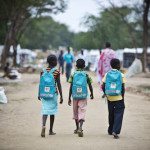Parents in north-eastern Uganda are sending toddlers of pre-school age to school with their siblings to share their free school meal as increasing numbers of families have no food at home, according to Save the Children.
More than 40 per cent of people are now going hungry in Karamoja region, one of Uganda’s poorest and most marginalized regions that are predominantly a pastoralist community, the child rights organisation said.
Karamoja, that borders Kenya and South Sudan, is reeling from a combination of extreme weather, disease and armed gang attacks which have driven more than half a million people to crisis levels of hunger.
Last year communities in Karamoja were hit by floods and landslides. This year’s rainy season, between March and June, was likely the driest on record since 1981 with this harsh drought decimating crops and livestock and causing water shortages.
The situation in the rural north eastern region has deteriorated in recent years. In June 2020, 27 per cent of households experienced food shortages which increased to 30 per cent in April 2021, and reached 41 per cent in April this year, with the crisis worsened by the war in Ukraine driving up food prices.
Save the Children said more than 91,600 children and 9,500 pregnant or breastfeeding women in Karamoja are suffering from acute malnutrition and need urgent treatment.
Across the Horn of Africa, four failed rainy seasons have led to the worst drought in 40 years, leaving more than 18.6 million people facing an alarming hunger and malnutrition crisis which is extending across the East Africa region to Uganda, South Sudan and Sudan.
Natalina, 10, who goes to a community school supported by Save the Children in Karamoja, walks there with her four-year-old and two-year-old sisters, the youngest strapped to her back. She said: “Every day, I come to school with two of my siblings. One is four years old while the other is two years old.
“I share my food with my two siblings because they’re not yet old enough to be in school, so I’m the only one who receives food.”
Emmanuel works as a teacher at another school supported by Save the Children in Moroto, Karamoja. He said: “When families do not have food and younger children follow their siblings to school, it not only reduces concentration but also gives older siblings the added burden of caring for children instead of studying.”
Save the Children’s Country Director in Uganda, Strinic Dragana, said: “The fact that families are sending their pre-school children to class with their siblings just so they can eat is a major cause for concern. We know that in some schools, there are up to 200 siblings tagging along to get a meal.
“We’re doing what we can with the little resources available but more needs to be done, especially now that schools have broken up and children have been sent home for August holidays with no food.
“Karamoja reflects a bigger global crisis. The next generation is bearing the brunt of a global hunger crisis and climate emergency that it did not contribute to. We’re calling on the government and the international community to make more funds available to support families and children suffering from this hunger crisis in northern Uganda.”
The climate crisis is making extreme weather events such as drought and flooding more frequent and severe, Save the Children said. The child rights organisation’s research with Vrije Universiteit Brussel, Born into the Climate Crisis, shows that children born in 2020 will face 2.6 times as many droughts and 2.8 times as many floods throughout their lifetimes as those born 60 years ago.
Save the Children is providing food assistance to over 40 schools in Karamoja and cash vouchers worth Shs 150,000 (US$40) every month to families with extremely malnourished children to buy food. But for many families sending young children to school with their older siblings is the only way to ensure the children have at least a meal day.








